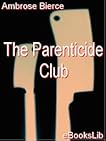
an act which made a deep impression on me at the time.
--Opening Sentence of
An Imperfect Conflagration, The Parenticide Club. The Parenticide Club
The Parenticide Club by
Ambrose BierceMy rating:
4 of 5 starsAmbrose Bierce once gave a review which I would here apply to his
The Parenticide Club: "The covers of this book are entirely too far apart." Yet, in a way, I loved it. It is truly horrific and appalling. The title says all you need to know: it's a collection of stories in which children murder their parents; Bierce's dry, lightly whimsical, journalistic prose starkly outlined against the backdrop of a gruesome, vicious celebration of murder after murder. Never, ever read it. But, in a way, I did love it.
To understand my four star review of a book that I shelved as appalling, a book in which half of my half-hour reading was spent rereading sentences in appalled disbelief, a bit of background may be necessary. I read a good bit, and have for some time. When I was in high school, my class was assigned
Occurrence at Owl Creek Bridge in which Bierce describes in his always exquisite, deeply gothic prose, dry as the only sherry I'll drink, the botched hanging of a Civil War spy and his subsequent escape. Then, when he is almost safely in the home he is longing to reach, he feels a tremendous pressure on his neck and sees a blinding flash of light. The hanging hadn't failed, and he never escaped: the entire episode was in his head.
I had read stories where the protagonist dies, but I had never before encountered one in which the protagonist was nonexistent, or a real story arc in which there was no real conflict--I hadn't known it was allowed. Bierce gave us a hero, then revealed that while we were rooting for him, dodging bullets with him, feeling the exhaustion he was feeling, this entire time our hero was falling off a bridge with a noose under his left ear. Well, I loved his prose, and was fascinated with his ability to take nihilism to an entirely new level, so I got his Devil's Dictionary (he wanted to title it the Cynic's Word Book), and he now holds a special place in my heart as one of the most quotable authors on the planet (Chesterton is obviously greater than the rest, in several senses).
So, this book, this collection of short stories was what I expected. I was braced, and I bookended him with Bach to avoid the "slit carotid artery and do push-ups in the bathtub" impulse that he inevitably seems able to inspire. The most astonishing achievement is his ability to make such horrific villains, such truly amoral
bastards as the main characters of these stories seem almost sympathetic.
View all my reviews

 The Day Boy and the Night Girl by George MacDonald
The Day Boy and the Night Girl by George MacDonald



